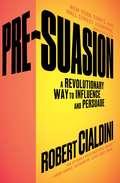- Table View
- List View
Praxistipps für Nachwuchs-Führungskräfte: Ratschläge eines Top-Managers
by Egon MinarIn diesem Fachbuch wendet sich der sehr erfahrene Autor an junge Manager und Nachwuchs-Führungskräfte. Auf Basis seiner langjährigen Erfahrungen teilt er praxisnahe Empfehlungen zu einer Vielzahl von Führungsthemen und zu verschiedenen Situationen im beruflichen Alltag einer Führungskraft.Aus eigener Erfahrung weiß Egon Minar, dass Universitäten und Fachhochschulen zwar theoretisches Wissen vermitteln, die Umsetzung in die Praxis jedoch nicht trivial ist. In 55 kurzen Kapiteln greift er daher Themen auf, die ihn während seines Berufslebens begleitet haben und die er nun weitergeben möchte. Da Mitarbeiterführung für ihn zu den zentralen Aufgaben einer Führungskraft gehören, widmet er diesem Themenkomplex besondere Aufmerksamkeit.Ergänzend zu seinen praxisorientierten Ratschlägen, verweist der Autor für komplexe und besonders wichtige Führungsaufgaben auf entsprechende weiterführende Fachliteratur.
Praxistipps für erfolgreiche Teamarbeit: Handlungsempfehlungen aus dem Sport für Unternehmen und Organisationen (essentials)
by Marco MeierUnternehmen und Organisationen befinden sich in einem tiefgreifenden Wandel und haben es schwer, qualitativ gutes Personal zu rekrutieren und die Mitarbeitenden langfristig und emotional an das Unternehmen zu binden. Die Konkurrenzsituation auf dem Arbeitsmarkt hat sich stark verändert. Dieser Wandel bringt nicht nur Risiken, sondern auch Chancen mit sich. Die Bedeutung und die Wichtigkeit von Teams setzen sich nicht nur im Sport, sondern auch in der Wirtschaft immer stärker durch. Marco Meier liefert zu den Bereichen Teamgeist und Zusammenhalt, Rahmenbedingungen und Regeneration, Ziele und messbare Erfolge sowie Flexibilität wertvolle Hinweise und praktische Handlungsempfehlungen für Unternehmen und Organisationen, um neues und aktuelles Personal emotional und langfristig an sich zu binden.Der Autor:Der Sportmanager (B.A.) und Wirtschaftspsychologe (M.A.) Marco Meier ist langjähriger Fußballtrainer von Herren- und Jugendmannschaften im Amateur- und Leistungsbereich. Er hat sich in den Bereichen Coaching, Training und Beratung für Sportler, Privatpersonen und Unternehmen selbstständig gemacht. Er ist außerdem Lehrbeauftragter an den Fakultäten Sportmanagement und Wirtschaftspsychologie der Hochschule für angewandtes Management (HAM) in Ismaning.
Praxiswissen Franchising: So multiplizieren Sie Ihr Geschäftsmodell – Leitfaden und Toolbox für Gründer
by Hubertus BoehmFranchising ist ein Multiplikator für Geschäftsmodelle, er vervielfacht Erfolge ebenso wie Misserfolge. Voraussetzung für eine erfolgreiche Skalierung ist, dass die vielfältigen „Mosaiksteine“ eines Franchisesystems optimal zusammenwirken. Gelingt dies nicht, sind Verluste von Kapital, Zeit und Reputation vorprogrammiert. Dieser Leitfaden bietet Hilfestellung bei der Entscheidung, ob eine Expansion mittels Franchising erfolgversprechend ist und vermittelt das erforderliche Basiswissen zur Entwicklung und Gründung eines Franchisesystems. Aus dem Fundus von jahrzehntelanger Franchise-Erfahrung zeigt der Autor auf, welche Voraussetzungen gegeben sein müssen, welche Gestaltungsoptionen bestehen, welche Details zu entscheiden sind und wie das Netz selbstständiger Unternehmer auf Dauer zusammengehalten werden kann. Darüber hinaus erfahren Sie, wie Sie Fehlentscheidungen und Planungsfehler vermeiden und zugleich Entwicklungskosten und -zeit sparen.Prüfen Sie, ob ein Franchisesystem die optimale Vertriebsmethode für Sie ist. Finden Sie heraus, welche Franchisekonzeption zu Ihrem Business passt. Erfahren Sie, wo Sie aktuell stehen, wo Ihre Lücken sind, wo Gefahren drohen und in welchen Schritten Sie vorgehen können, um Ihre Expansion auf ein solides Fundament zu stellen. Und denken Sie daran: Ein Franchisesystem ist ein ,,Maßanzug" und keine ,,Konfektion". Nutzen Sie die Checklisten und Muster in diesem Buch für eine situationsgerechte, individuelle Planung.
Praxiswissen Führung
by Peter BergerDieses Buch vermittelt wissenschaftlich fundierte Grundlagen personaler und organisationaler Führung. Es bietet realistische Einblicke in die Praxis von Führungskräften und regt zur Reflexion etablierter Führungsleitbilder an. Der Autor geht zunächst der Frage nach, warum sich erwachsene Menschen freiwillig fremden Autoritäten unterwerfen. Er untersucht die notwendigen Grundkompetenzen einer Führungskraft und beleuchtet die organisationalen Dimensionen von Führung. In beiden Bereichen bietet er umfangreiches Basiswissen und realitätsnahe Reflexionsfelder.
Praxiswissen Personalcontrolling
by Helmut Siller Jürgen Stierle Katja GlasmachersDieses fundierte Praxishandbuch zeigt entscheidende Wege auf, wie Arbeitgeber sich attraktiv positionieren können, wie das Unternehmen wichtige Mitarbeiter erfolgreich bindet und wie das Engagement dauerhaft erhalten bleibt. Die Ressource Mensch als Know-how-Träger ist weit mehr als ein bloßer Kostenfaktor, den es zu steuern gilt. Personalcontrolling wird als Mitgestaltung der Personalarbeit verstanden und dient als Führungsunterstützung, um mit transparentem Monitoring gemeinsame Ziele des Personalressorts zu erreichen. Personalexperten diskutieren interdisziplinär in diesem modulartig aufgebauten Werk.
Praxiswissen Wirtschaftsmediation: Strategien, Modelle und Methoden für Unternehmen
by Christa Fischer-Korp Ilse Ennsfellner Bernhard Wisleitner Margit Ehardt-Schmiederer Claudia Pöschl Michael HambergerDieses Buch bietet einen Überblick über Anwendungsmöglichkeiten der Wirtschaftsmediation und mediativer Dienstleistungen. Praktische Beispiele präsentieren Strategien, mediative Modelle und Methoden für konkrete Lösungswege. Die Buchbeiträge bieten Wirtschaftstreibenden verständliche Einblicke und sprachlich bebilderte Ausblicke – quer durch bunte Landschaften betrieblicher Herausforderungen. Die AutorInnen sind ExpertInnen der Wirtschaftsmediation und bündeln ihr breites Wissen und ihre vielfältigen Erfahrungen. Von Interesse ist das Buch für UnternehmerInnen, Führungskräfte und MitarbeiterInnen - also all jene, die aus den mediativen Dienstleistungen einen Mehrwert für sich und ihr Unternehmen oder ihr Arbeitsumfeld schöpfen möchten.
Pre-Accident Investigations: An Introduction to Organizational Safety
by Todd ConklinTime-pressed, professionals looking for practical guidance to shape their current or future safety programs should use this book. Pre-Accident Investigations: An Introduction to Organizational Safety helps to identify complex potential incidents before they take place. Based around the ’New View’ of human error, it offers established human performance theory in a highly practical context. Written in an engaging, conversational style, around several case studies, the book is grounded in reality, with examples with which anyone can identify. It is an ideal aid for senior safety executives who want to spread the safety message among their colleagues. It is also an excellent choice for course tutors looking for a narrative-led primer.
Pre-Commerce
by Bob Pearson Mark AddicksIdeas for leaders to engage directly with customers to shape their brand and marketplace successSince its debut E-commerce has been centered on the transaction, which represents less than one percent of the time we spend online. Now, we are entering the era of Pre-Commerce where customers make their own decision to buy or support a brand before the transaction. Pre-Commerce explains how the exploding use of social media channels has fundamentally changed the way customers go about making their purchasing decisions, how they educate themselves and why they choose to support certain brands above others. It shows what executives must do to re-create the way their companies interact with and learn from their customers, employees and competitors. It includes exclusive interviews and anecdotes Pearson has conducted or experienced with numerous influential C-suite executives during his time as leader of Dell's global social media team and as a consultant to Fortune 1000 companies, worldwide.Offers a step-by-step process for leaders to apply this knowledge to begin transforming their companies, right nowBegins with a foreword from Mark Addicks, Chief Marketing Officer, General MillsOver 25 Fortune 500 executives interviewed, including special side-bar interviews with Michael Dell and Marc BenioffExplores the concept of "Pre-commerce"--the customer's decision making happens well before a transaction takes place and continues after the transaction, representing 99% of time spent online, often outside a company's reach todayShows how to build internal employee networks and how to take your first and most important steps to integrate social media throughout your company.Pearson reveals that the best ideas are often free and the technology needed is rarely a cost-issue. Instead, it's a matter of the top executive deciding to adopt a new way of engaging directly with its customers.
Pre-Employment Background Investigations for Public Safety Professionals
by Frank A. Colaprete***Author Radio InterviewJoin Dr. Frank A. Colaprete for an upcoming interview on the Privacy Piracy show on KUCI 88.9FM. Click here on September 2nd, 2013 at 8:00 a.m. PST to listen in.Pre-employment investigations have been the subject of intense review and debate since 9/11 made the vetting of applicants a critical function of every organization
Pre-Industrial Societies
by Patricia CroneThis book offers a blueprint for a world now lost, focusing on such crucial issues as the role of politics and religion, and how communities developed social hierarchies.
Pre-Paid Legal Services, Inc.
by Jacob Cohen Paul M. HealyPre-Paid Legal Services' business model reveals two key issues--managing the sales force and sales growth and managing claims. Students analyze the economics of the business and consider how to measure firm performance, how to evaluate and reward the sales force, and what services to offer. The case also discusses a Fortune article criticizing Pre-Paid Legal's method of reporting sales force commissions. Students are asked to evaluate Fortune's analysis and to recommend potential responses by Pre-Paid Legal's management.
Pre-Project Excellence: Unleashing the Power of IpOp Model and ISO 56007 for Superior Project Selection and Outcomes (Future of Business and Finance)
by Raphael H CohenThis guide complements traditional project management by focusing on the critical pre-project stage. It addresses a major challenge: only 12% of projects finish on time and within budget, often due to poor initial pre-project analysis. This leads to wasted resources. The content offers proven best practices for implementing ISO 56007 recommendations, enhancing project calibration, selection, and overall success rates. Liberating innovators from the constraints of traditional business plans, the guide suggests, along with ISO 56007, a "Concept/Opportunity Case" as an investor-friendly alternative. This template is rooted in the robust IpOp Decision Tree, an ISO 56007-recommended checklist of 11 fundamental questions to thoroughly address essential decision-makers' concerns. This rigorous method ensures reliable project selection and optimal resource allocation. The IpOp Model serves as a structured roadmap, enabling project managers and innovators to transform ideas into compelling projects. It provides clear guidance for making informed decisions, whether to pivot or abandon projects that aren’t viable. By following ISO 56007 recommendations, the IpOp Model helps navigate uncertainties and manage critical project factors effectively. Ideal for decision-makers, project managers, executives, professionals, intrapreneurs, and entrepreneurs engaged in project management and innovation, this guide is an essential tool for any pre-project analysis and for turning innovative ideas into successful projects.
Pre-Start Analysis: A Framework for Thinking About Business Ventures
by Howard H. Stevenson John R. Van SlykeDescribes the thought process an entrepreneur should undergo before committing to a course of action. Covers understanding the opportunity--assessing the critical skills, resources, relationships, and approvals--developing an action plan; forming a business entity; controlling the venture; harvesting the venture; and then a brief summary. Provides a useful framework to be used by entrepreneurs starting their own venture.
Pre-Suasion: A Revolutionary Way to Influence and Persuade
by Robert CialdiniThe author of the legendary bestseller Influence, social psychologist Robert Cialdini shines a light on effective persuasion and reveals that the secret doesn't lie in the message itself, but in the key moment before that message is delivered.What separates effective communicators from truly successful persuaders? Using the same combination of rigorous scientific research and accessibility that made his Influence an iconic bestseller, Robert Cialdini explains how to capitalize on the essential window of time before you deliver an important message. This "privileged moment for change" prepares people to be receptive to a message before they experience it. Optimal persuasion is achieved only through optimal pre-suasion. In other words, to change "minds" a pre-suader must also change "states of mind." His first solo work in over thirty years, Cialdini's Pre-Suasion draws on his extensive experience as the most cited social psychologist of our time and explains the techniques a person should implement to become a master persuader. Altering a listener's attitudes, beliefs, or experiences isn't necessary, says Cialdini--all that's required is for a communicator to redirect the audience's focus of attention before a relevant action. From studies on advertising imagery to treating opiate addiction, from the annual letters of Berkshire Hathaway to the annals of history, Cialdini draws on an array of studies and narratives to outline the specific techniques you can use on online marketing campaigns and even effective wartime propaganda. He illustrates how the artful diversion of attention leads to successful pre-suasion and gets your targeted audience primed and ready to say, "Yes."
Pre-suasión: Un método revolucionario para influir y persuadir
by Robert CialdiniUn método revolucionario para influir y persuadir. La persuasión es una habilidad imprescindible en cualquier actividad profesional a todos los niveles en organizaciones y empresas. Pero, ¿cuáles son las mejores técnicas de persuasión?, ¿qué elementos de la comunicación permiten conquistar al público?, ¿cuáles son los momentos fundamentales en una argumentación? y ¿qué diferencia a un comunicador eficaz de un auténtico persuasor? Con el rigor científico y la capacidad de divulgación que le caracterizan, Robert Cialdini explica en este libro cómo capitalizar el tiempo previo a la transmisión de un mensaje importante. Ese instante puede hacer que el público se muestre más receptivo y, de este modo, la persuasión óptima solo se obtiene con una óptima «pre-suasión». Para persuadir, lo único que necesita el comunicador es redirigir la atención del público antes de una acción relevante para que este le diga «¡Sí!». Con solidez científica, Cialdini muestra cómo escoger no solo lo que vamos a decir, sino cuándo lo vamos a hacer y cómo atraer esa atención de una forma ética. Con Pre-suasión los lectores aprenderán a aprovechar el momento oportuno para ganar influencia y a conservarla. Reseñas:«Pre-suasión está destinado a convertirse inmediatamente en un clásico.»Forbes.com «Mi impresión sobre este libro se resume en una palabra: persuasor.»The Wall Street Journal «Un libro que recomendaré durante años.»Amy Cuddy, profesora asociada de Administración de empresas de la Harvard Business School y autora de El poder de la presencia «Una lectura fascinante sobre cómo el motor más importante de la persuasión no son las palabras que elegimos sino cómo las presentamos antes.»Adam Grant, profesor de Management y Psicología en The Wharton School y autor de Dar y recibir
PreachersNSneakers: Authenticity in an Age of For-Profit Faith and (Wannabe) Celebrities
by Ben KirbyFounder of the phenomenon social media account PreachersNSneakers tackles how faith, capitalism, consumerism, and (wannabe) celebrity have collided.What started as a joke account on Instagram has turned into a movement. Through this provocative project, the founder of PreachersNSneakers is helping thousands of Jesus followers wrestle with the inevitable dilemmas created by a culture obsessed with image and entertainment.In PreachersNSneakers: Authenticity in an Age of For-Profit Faith and (Wannabe) Celebrities, the author boldly confronts many of the difficult questions plaguing countless Christians&’ minds, such as:Should pastors grow wealthy off of religion, and why do we get so angry when they do?Is it okay to stoke envy among others with curated &“lifestyle&” images on social media?Do we really believe that divine blessings are monetary, or is that just religious wallpaper to hide our own greed?Is there space in Christendom for celebrities like Kanye and Bieber to exist without distorting the good news?What about this: Is it wrong for someone like this author to call out faith leaders online and leverage &“cancel culture&” to affect change?PreachersNSneakers will navigate these challenging questions and many more with humor, wit, candor, and a few never-before-published hijinks. Each chapter will explore the various sides of the debate, holding space for readers to make up their own minds. The book will doubtlessly become a staple for church small groups, college ministries, and book clubs, emboldening struggling believers who want to live a more genuine faith.After all, the Lord works in mysterious colorways.
Preaching: Communicating Faith in an Age of Scepticism
by Timothy KellerNew York pastor and acclaimed author Timothy Keller is widely known and respected for his compelling preaching, described by The New York Times as what has 'helped turn Dr Keller... into the pastor many call Manhattan's leading evangelist'. In this book he shares his wisdom on communicating the Christian faith from the pulpit as well as from the coffee shop. Most Christians - including pastors - struggle to talk about their faith in a way that applies the power of the Christian gospel to change people's lives. Timothy Keller is known for his insightful, down-to-earth sermons and talks that help people understand themselves, encounter Jesus and apply the Bible to their lives. In this accessible guide for pastors and laypeople alike, Keller helps readers learn to present the Christian message of grace in a more engaging, passionate and compassionate way.(P)2015 Penguin Audio
Preaching: Communicating Faith in an Age of Scepticism (The\gospel Coalition Ser.)
by Timothy Keller'It is an unexpected delight to read a book on preaching that makes you want to preach. Tim Keller has given us such a book... Here is an extremely readable book founded on sound scholarship... buy it. This is the most practical and inspirational book on preaching that I have read for years!' - The Methodist Recorder'In Preaching, Keller has made an invaluable contribution to the homiletic task. I would recommend that this book be placed in the hand of the preaching veteran and novice, and should be found in the homiletic section of all theological colleges.' - Christianity magazineNew York pastor and acclaimed author Timothy Keller is widely known and respected for his compelling preaching, described by The New York Times as what has 'helped turn Dr Keller... into the pastor many call Manhattan's leading evangelist'. In this book he shares his wisdom on communicating the Christian faith from the pulpit as well as from the coffee shop. Most Christians - including pastors - struggle to talk about their faith in a way that applies the power of the Christian gospel to change people's lives. Timothy Keller is known for his insightful, down-to-earth sermons and talks that help people understand themselves, encounter Jesus and apply the Bible to their lives. In this accessible guide for pastors and laypeople alike, Keller helps readers learn to present the Christian message of grace in a more engaging, passionate and compassionate way.
Precalculus with Limits: A Graphing Approach
by Ron LarsonThe goal of MANAGEMENT: AN INTEGRATED APPROACH, 2nd Edition, is to prepare students for leadership positions in 21st century companies by addressing the many facets involved in answering one key question: How are leaders successfully managing competitive companies in the 21st century? Today's constantly changing business environment presents challenges and opportunities that are more dynamic and complex than ever before, requiring a clear understanding of the interactive nature of strategy, organizational design, and leadership. MANAGEMENT: AN INTEGRATED APPROACH, written by prominent Harvard management educators Ranjay Gulati, Anthony Mayo, and Nitin Nohria, is the only introductory management text on the market to address this challenge by taking an integrated and holistic approach to management, as opposed to a functional approach, making it more relevant to how today's organizations run. By demonstrating the interconnectivity among the three key pillars of management, students see how decisions impact strategic choices, organizational alignment, and leadership approaches, ultimately leading to the overall performance of the company. MindTap for Gulati/Mayo/Nohria's MANAGEMENT: AN INTEGRATED APPROACH, has been completely revised and updated to incorporate a suite of new digital resources designed to facilitate and measure student success. This unique approach will develop a sustainable and successful leadership style, better preparing students for higher level courses and making them more marketable upon graduation.
Precarious Asia: Global Capitalism and Work in Japan, South Korea, and Indonesia (Emerging Frontiers in the Global Economy)
by Arne L. Kalleberg Kevin Hewison Kwang-Yeong ShinPrecarious Asia assesses the role of global and domestic factors in shaping precarious work and its outcomes in Japan, South Korea, and Indonesia as they represent a range of Asian political democracies and capitalist economies: Japan and South Korea are now developed and mature economies, while Indonesia remains a lower-middle income country. With their established backgrounds in Asian studies, comparative political economy, social stratification and inequality, and the sociology of work, the authors yield compelling insights into the extent and consequences of precarious work, examining the dynamics underlying its rise. By linking macrostructural policies to both the mesostructure of labor relations and the microstructure of outcomes experienced by individual workers, they reveal the interplay of forces that generate precarious work, and in doing so, synthesize historical and institutional analyses with the political economy of capitalism and class relations. This book reveals how precarious work ultimately contributes to increasingly high levels of inequality and condemns segments of the population to chronic poverty and many more to livelihood and income vulnerability.
Precarious Labour and Informal Economy: Work, Anarchy, and Society in an Indian Village
by Smita YadavAn empirical account of one of India’s largest indigenous populations, this book tells the story of the Gonds—who currently face displacement and governmental control of the region’s forests, which has crippled their economy. Rather than protesting and calling for state intervention, the Gonds have turned toward an informal economy: they not only engage with flexible forms of work, but also bargain for higher wages and experience agency and autonomy. Smita Yadav conceives of this withdrawal from the state in favour of precarious forms of work as an expression of anarchy by this marginalized population. Even as she provides rich detail of the Gonds’ unusual working lives, which integrate work, labour, and debt practices with ideologies of family and society, Yadav illustrates the strength required to maintain dignity when a welfare state has failed.
Precarious Professional Work
by Alexander StyhreThis book examines the new conditions under which professional work, often referred to as "knowledge-intensive work," is organised and how professional groups who have traditionally been granted jurisdictional discretion now have their work routines renegotiated. In the new economic regime of what has been called "investor capitalism" and under the influence of shareholder primacy governance, professional work is put under pressure to change. The author explores issues of increased financial and economic volatility, the pressure to outsource and offshore professional work and the increased supply of competitors with tertiary education degrees in the labour market. Examining both macroeconomic conditions and policy that inform and shape the domain of professional work, the book emphasises how the nature of professional work has changed since the 1980s and 1990s and argues that it is no longer a "safe haven" for a favoured group of elite workers. Precarious Professional Work underlines how the study of professions must constantly accommodate new economic conditions and managerial practices to better understand how professional work is dependent on and entangled with external social, economic, and political conditions.
Precarious Workers in the Gig Economy: Neoliberalism and its Discontents in Indonesia (Contestations in Contemporary Southeast Asia)
by Diatyka Widya Permata YasihThis book focuses on gig work and organising among gig workers in the Indonesian online transport service, situated within the context of widespread precaritisation and digitalisation in today’s world of work. It addresses the challenges experienced by precarious gig workers in Indonesia in articulating their struggles through the discourse of precarity. Such challenges are related to the reproduction of neoliberal-derived entrepreneurial aspirations amidst the historical relative absence of stable work patterns (previously associated with more advanced economies), and the historically rooted marginalisation of broad-based labour movements as a social force. Though showcasing the specific experiences of Indonesian workers, the analysis in this book is supplemented by broad comparative insights. It offers empirically based analysis for those interested in new forms of collective organisations and politics that emerge among workers under the imperatives of neoliberalism in Indonesia, and by extension Southeast Asia.
Precarity and Belonging: Labor, Migration, and Noncitizenship (Latinidad: Transnational Cultures in the United States)
by Catherine S. RamírezPrecarity and Belonging examines how the movement of people and their incorporation, marginalization, and exclusion, under epochal conditions of labor and social precarity affecting both citizens and noncitizens, have challenged older notions of citizenship and alienage. This collection brings mobility, precarity, and citizenship together in order to explore the points of contact and friction, and, thus, the spaces for a possible politics of commonality between citizens and noncitizens.The editors ask: What does modern citizenship mean in a world of citizens, denizens, and noncitizens, such as undocumented migrants, guest workers, permanent residents, refugees, detainees, and stateless people? How is the concept of citizenship, based on assumptions of deservingness, legality, and productivity, challenged when people of various and competing statuses and differential citizenship practices interact with each other, revealing their co-constitutive connections? How is citizenship valued or revalued when labor and social precarity impact those who seemingly have formal rights and those who seemingly or effectively do not? This book interrogates such binaries as citizen/noncitizen, insider/outsider, entitled/unentitled, “legal”/“illegal,” and deserving/undeserving in order to explore the fluidity--that is, the dynamism and malleability--of the spectra of belonging.
Precarity and International Relations (International Political Economy Series)
by Ritu Vij Tahseen Kazi Elisa Wynne-HughesThis book addresses the implications of current thinking on precarity, precariousness and the precariat for the study of International Relations and International Political Economy. Drawing on a broad range of critical theoretical resources including literatures on aesthetics and psychoanalysis as well as feminist, Foucauldian, Marxian and postcolonial social theory, it explores the implications of precarity thought for three concepts: Sovereignty, Solidarities and Work in International Relations. Does precarity re-inscribe or undermine the logic and practices of sovereignty? As a common condition and point of mobilization, does precarity represent a new labor activism or does it find ethical grounds for solidarities that destabilize identities? How is precarity located, practiced and occluded in work relations? Running counter to the contemporary impulse to grasp precarity and processes of its proliferation in homogenized terms as either being ensconced in national imaginaries, or as ushering in a condition of global precarity and a global precariat class, the book also underscores the entanglements of the global, national and local in the discursive and material production of precarity and precariousness in the present conjuncture.























